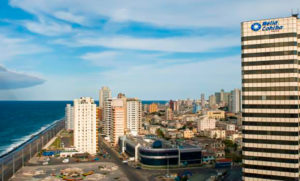 EMPRESAS ESPAÑOLAS SE PREPARAN ANTE LA POSIBLE REACTIVACION DE “LA LEY HELMS-BURTON” NORTEAMERICANA A CUBA.
EMPRESAS ESPAÑOLAS SE PREPARAN ANTE LA POSIBLE REACTIVACION DE “LA LEY HELMS-BURTON” NORTEAMERICANA A CUBA.
Las compañías españolas Meliá e Iberostar han contratado los servicios de varios despachos de abogados para preparar su defensa en caso de reclamaciones en EEUU de bienes confiscados por el castrismo, después de que la Administración Donald Trump apretara más las tuercas del embargo sobre La Habana, informó el suplemento Cinco Días del diario El País.
Washington estudia la reactivación completa del título III, congelado desde la aprobación de la Ley Helms Burton en 1996. El capítulo nunca se ha aplicado desde su promulgación hace 23 años, debido a que generaría una compleja maraña de litigios internacionales con empresas de diversos países que operan en Cuba.
Finalmente, el Gobierno de Donald Trump anunció el pasado 4 de marzo que prorrogaría un mes más su suspensión, sin embargo, con la salvedad de que sí se podrán interponer demandas contra compañías incluidas en una lista de entidades “bajo el control” de la Inteligencia y el Ejército cubanos, muchas de ellas administradas por el conglomerado empresarial de los militares, GAESA.
En ese registro figuran en la actualidad 205 entidades. Una de ellas es Gaviota, el grupo de turismo que posee 84 hoteles en la Isla en régimen de propiedad y cuya gestión cede a operadores extranjeros, entre las compañías españolas.
Meliá explota seis de esos hoteles (dos en Varadero, tres en Villa Clara y otro en Jardines del Rey) e Iberostar otros seis (uno en la Habana, tres en Varadero, uno en Villa Clara y otro en Jardines del Rey).
Si algún ciudadano hubiera registrado una demanda con anterioridad, podría activarse la reclamación contra los citados establecimientos gestionados por Meliá e Iberostar incluidos en esa lista negra.
Las dos empresas temen que se active un segundo escenario a partir del próximo 17 de abril, cuando particulares y empresas podrían demandar la recuperación de los bienes confiscados, siempre y cuando el Ejecutivo de EEUU active en pleno el capítulo III.
Ignacio Aparicio, socio de Andersen Tax & Legal y director del Cuban Desk del despacho, recordó a Cinco Días que existen cerca de 6.000 demandas certificadas ante la Comisión de Liquidación de Reclamaciones Extranjeras, una agencia dependiente del Gobierno, por importe estimado de 9.000 millones de dólares (7.959 millones de euros), pero se calcula que el importe global es muy superior.
Las dos empresas españolas más afectadas por ese endurecimiento del embargo serían Meliá e Iberostar. La primera tiene 32 hoteles operativos en la Isla, siete en construcción y unas 15.000 habitaciones, mientras que Iberostar tiene 21 hoteles y 6.300 habitaciones.
Despachos de abogados consultados por la edición de El País creen poco probable que se activen las expropiaciones, pero sí consideran más plausible que se aprueben otras medidas de presión económica. “Veo altamente improbable que uno de los reclamantes certificados pueda iniciar el proceso de reclamación, pero si lo hiciera eso podría generar un deterioro de la calificación crediticia de las compañías y podría provocar un recorte de las líneas de crédito a las empresas españolas”, recalcó Altozano, que acaba de regresar de un viaje a Londres donde ha tratado de ese tema con inversores ingleses con intereses en la Isla.
Otra oficina, que prefirió guardar el anonimato, consideró más probable la posible interposición de recursos y presentaron una posible derivada. “El pulso podría intensificarse si se pasara de la amenaza a la realidad y el Ejecutivo estadounidense también podría optar por embargar flujos de caja o activos de la compañía en suelo estadounidense”.
Meliá cuenta con tres establecimientos en EEUU (Nueva York, Miami y Orlando) e Iberostar cuenta con otros dos (Nueva York y Miami).
POSIBLE ACCION EUROPEA EN RESPUESTA A LA APROBACION DEL TITULO III.
Bruselas y Washington firmaron un memorando de entendimiento en 1997 que fijaba la suspensión del título III de la Ley Helms-Burton sine die a cambio de que Europa trabajara por la recuperación de los derechos humanos y la democracia en Cuba.
EEUU ya amenazó varios años después con activar las reclamaciones y la Unión Europea (UE) presentó una demanda ante la Organización Mundial del Comercio (OMC) que posteriormente retiró. A pesar de esto, fuentes jurídicas consultadas creen que se podría reactivar en cualquier momento.
Según Cinco Días, desde la Cámara de España se ha reclamado, si finalmente se produce el endurecimiento del embargo, la activación del artículo seis del Blocking Statute de la Unión Europea que permite a los estados miembros afectados por la Ley Helms-Burton iniciar acciones legales en territorio de la Unión Europea en contra de las empresas estadounidenses demandantes de sanciones a las empresas europeas con intereses en Cuba. Ese artículo, sin embargo, no afectaría a particulares.
Hermenegildo Altozano, socio del despacho Bird & Bird, considera que una respuesta adecuada por parte de la UE, en el caso de que se active el capítulo III de la ley Helms-Burton, sería la prohibición de entrar en suelo europeo a cualquier particular o empresa de los que haya presentado una demanda.
 SPANISH COMPANIES PREPARE FOR THE POSSIBLE REACTIVATION OF “LAW HELMS-BURTON” NORTH AMERICAN TO CUBA.
SPANISH COMPANIES PREPARE FOR THE POSSIBLE REACTIVATION OF “LAW HELMS-BURTON” NORTH AMERICAN TO CUBA.
The Spanish companies Meliá and Iberostar have hired the services of several law firms to prepare their defense in case of claims in the US of assets confiscated by the Castro regime, after the Donald Trump Administration tightened the screws of the embargo on Havana, reported the Cinco Días supplement of El País newspaper.
Washington is studying the complete reactivation of Title III, frozen since the approval of the Helms-Burton Act in 1996. The chapter has never been applied since its enactment 23 years ago because it would generate a complex web of international litigation with companies from various countries that they operate in Cuba.
Finally, the Government of Donald Trump announced on March 4 that it would extend its suspension one month longer, however, with the proviso that claims may be filed against companies included in a list of entities “under the control” of Intelligence. and the Cuban Army, many of them administered by the military business conglomerate, GAESA.
In that register, 205 entities currently appear. One of them is Gaviota, the tourism group that owns 84 hotels on the Island under the ownership and whose management is handed over to foreign operators, among Spanish companies.
Meliá operates six of these hotels (two in Varadero, three in Villa Clara and another in Jardines del Rey) and Iberostar another six (one in Havana, three in Varadero, one in Villa Clara and another in Jardines del Rey).
If a citizen had registered a claim beforehand, the claim against the aforementioned establishments managed by Meliá and Iberostar included in that blacklist could be activated.
The two companies fear that a second scenario will be activated from next April 17, when individuals and companies could demand the recovery of the confiscated assets, as long as the US Executive fully activates Chapter III.
Ignacio Aparicio, a partner of Andersen Tax & Legal and director of the Cuban Desk of the firm, reminded Cinco Días that there are nearly 6,000 registered claims before the Commission for the Settlement of Foreign Claims, an agency dependent on the Government, for an estimated amount of 9,000 million. dollars (7,959 million euros), but it is estimated that the overall amount is much higher.
The two Spanish companies most affected by this tightening of the embargo would be Meliá and Iberostar. The first has 32 hotels operating on the island, seven under construction and some 15,000 rooms, while Iberostar has 21 hotels and 6,300 rooms.
Law firms consulted by the El País edition believe that expropriations are unlikely to be activated, but they consider it more plausible that other measures of economic pressure be approved. “I think it is highly unlikely that one of the certified claimants could initiate the claim process, but if it did, that could lead to a deterioration in the credit rating of the companies and could lead to a cut in credit lines for Spanish companies,” he said. Altozano, who has just returned from a trip to London where he has dealt with this issue with English investors with interests in the Island.
Another office, which preferred to remain anonymous, considered the possible filing of appeals more likely and presented a possible derivative. “The pulse could intensify if the threat were moved to reality and the US executive could also choose to seize cash flows or assets of the company on US soil.”
Meliá has three stores in the US (New York, Miami, and Orlando) and Iberostar has two other stores (New York and Miami).
POSSIBLE EUROPEAN ACTION IN RESPONSE TO THE APPROVAL OF TITLE III.
Brussels and Washington signed a memorandum of understanding in 1997 that fixed the suspension of Title III of the Helms-Burton Law sine die in exchange for Europe working for the recovery of human rights and democracy in Cuba.
The US already threatened several years later to activate the claims and the European Union (EU) filed a complaint with the World Trade Organization (WTO) which it later withdrew. Despite this, legal sources consulted believe that it could be reactivated at any time.
According to Cinco Días, the Chamber of Spain has claimed, if finally the tightening of the embargo takes place, the activation of Article Six of the European Union Blocking Statute that allows member states affected by the Helms-Burton Act to initiate legal actions in the territory of the European Union against US companies seeking sanctions against European companies with interests in Cuba. That article, however, would not affect individuals.
Hermenegildo Altozano, a partner of the Bird & Bird office, considers that an adequate response from the EU, in the event that Chapter III of the Helms-Burton Act is activated, would be the prohibition to enter European soil to any individual or company that has filed a claim.
Agencies/ DDC/ Various/ Internet Photos/ Excerpts/ Arnoldo Varona/ www.TheCubanHistory.com
THE CUBAN HISTORY, HOLLYWOOD.
OVER 7,000 ARTICLES ABOUT CUBA. (SEARCH > www.TheCubanHistory.com



 < SPANISH COMPANIES are preparing for the Possible Reactivation of the American "Law Helms-Burton" to Cuba.
< SPANISH COMPANIES are preparing for the Possible Reactivation of the American "Law Helms-Burton" to Cuba.





